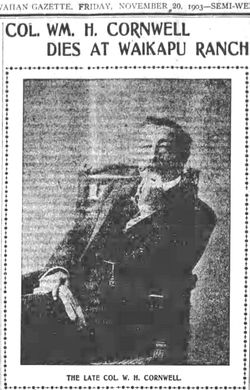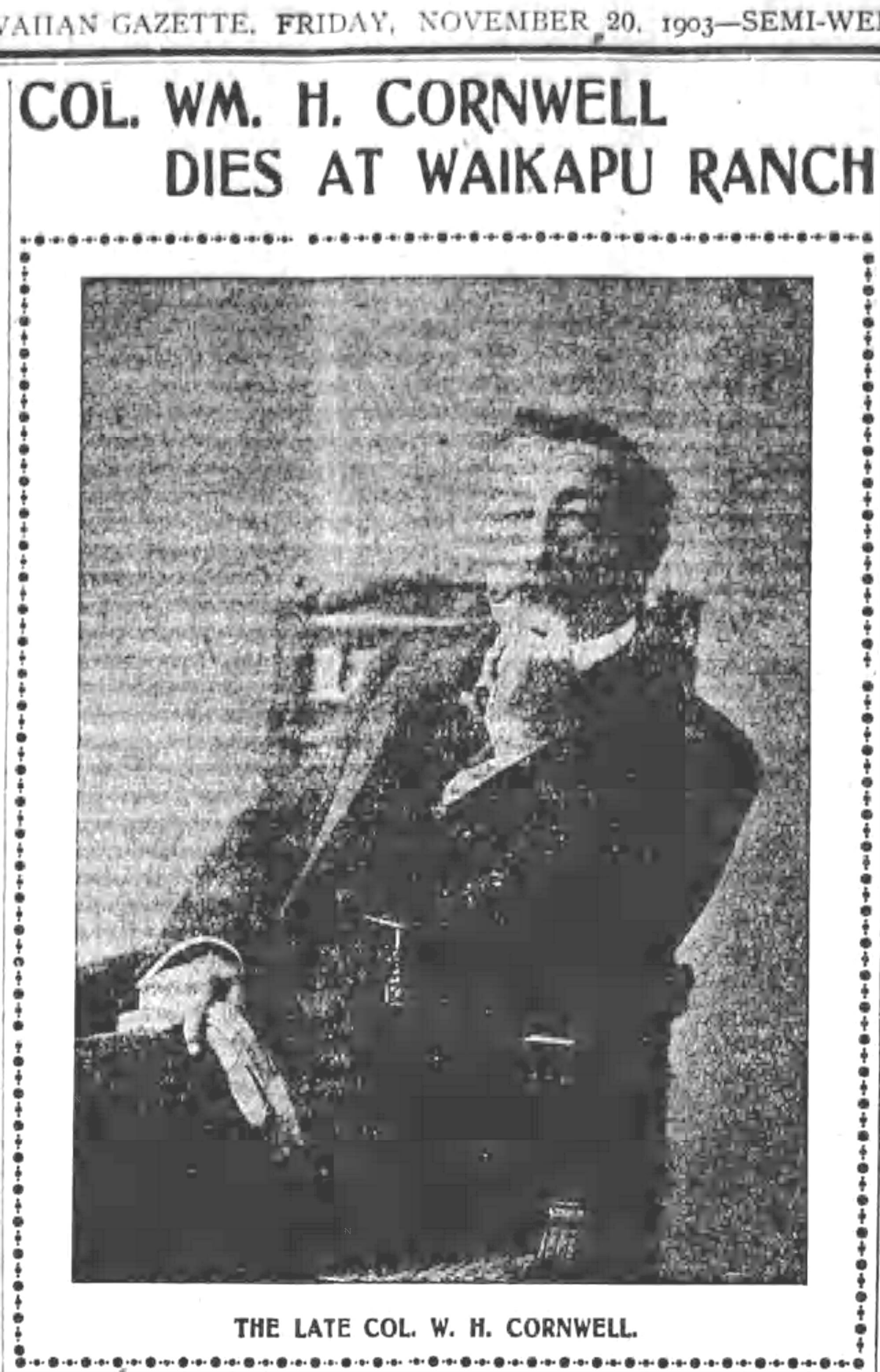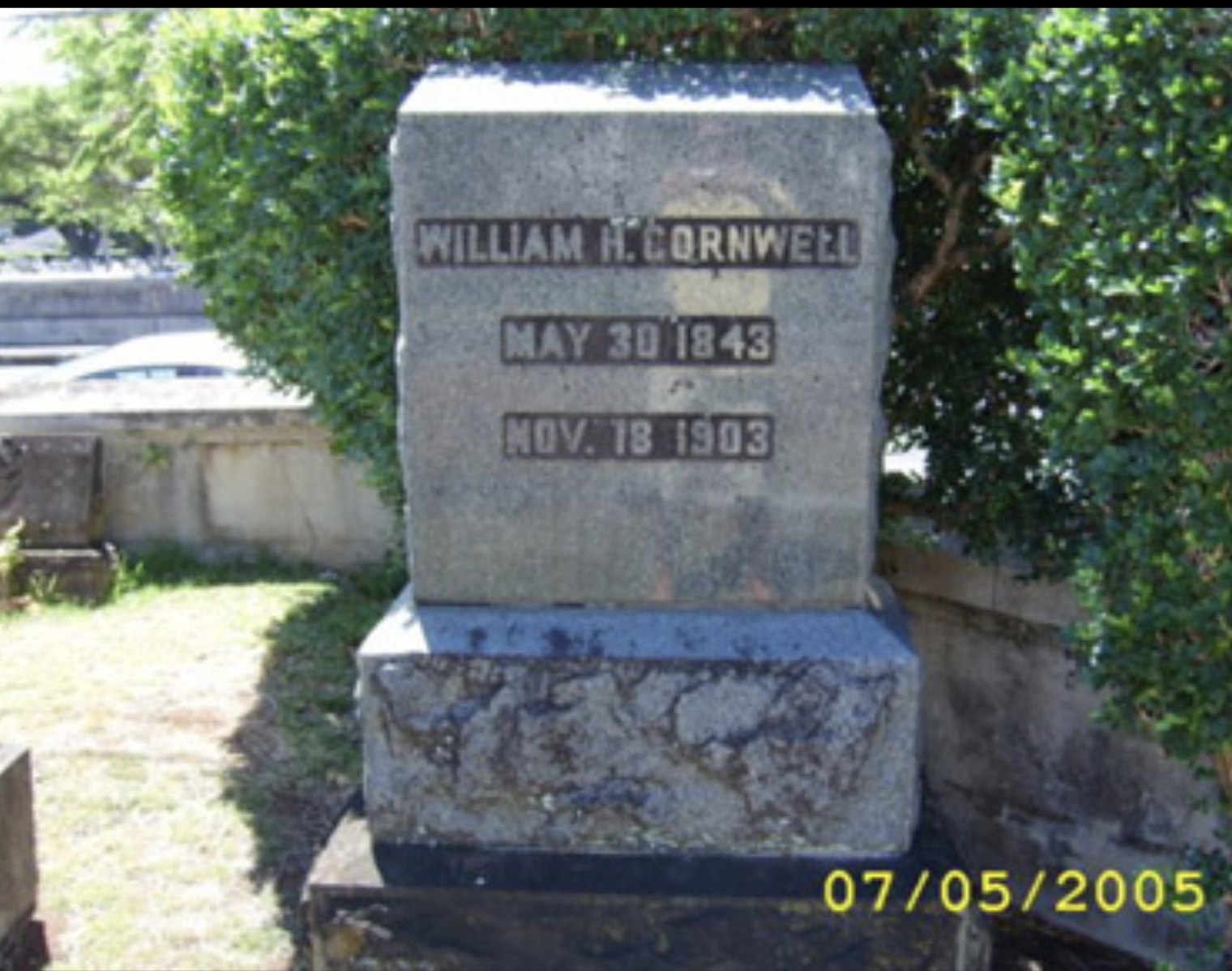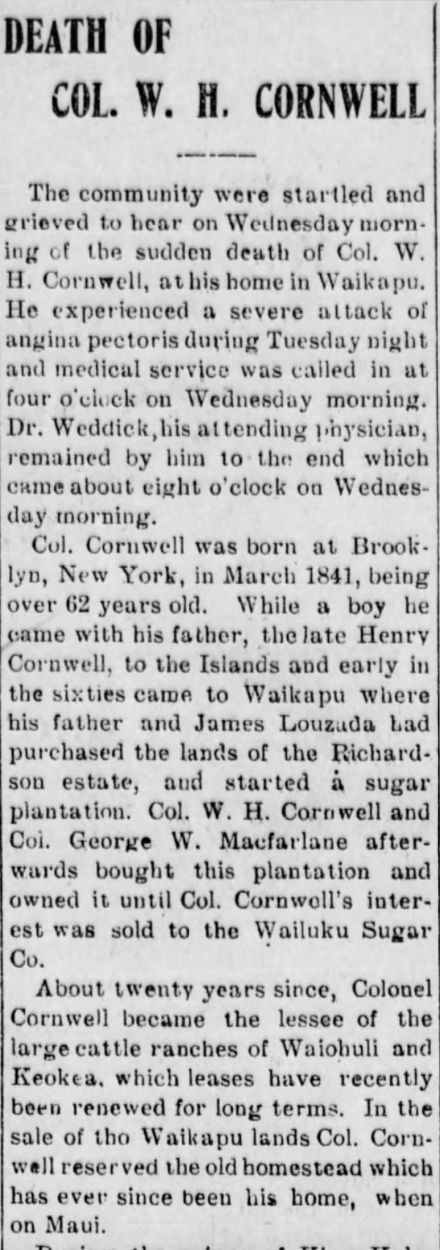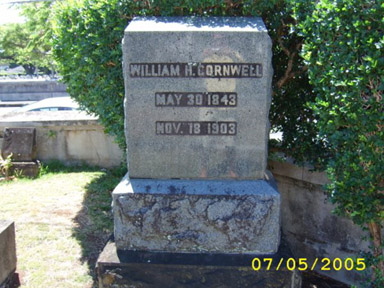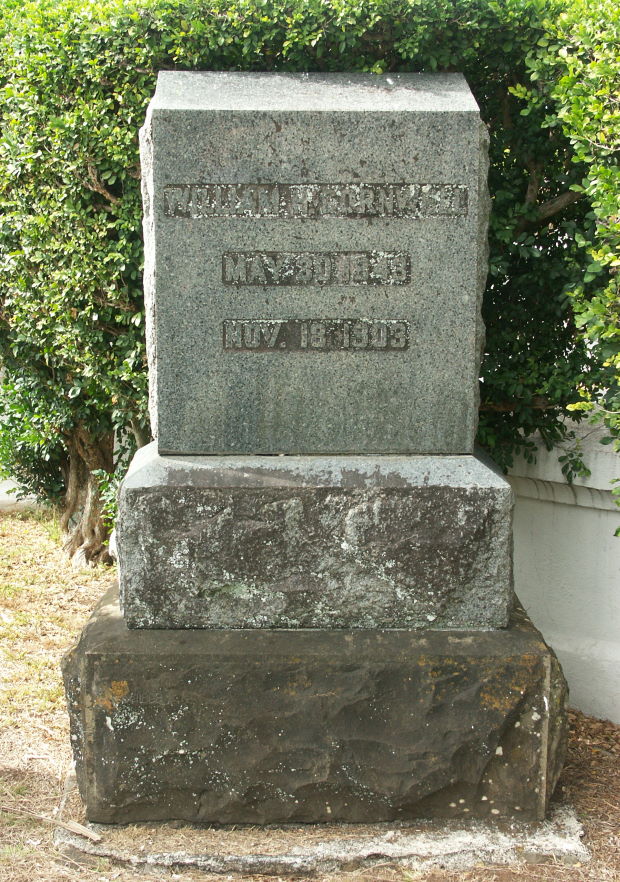He had three wives:
1) Helewaie Piena, and 2) Helen Blanche McFarlane, who he married on 31 Oct 1870, and 3) Mrs. Josephine Colvln
in Honolulu in Dec. 1902.
William was also called William Henry Cornwell, Jr.
By his first wife he had:
1) Katie C. Cornwell
2) James Kaipe Louzada Cornwell born 2 May 1869 in Waikapu, Maui, Hawaii James died 12 July 1964 in Bronson County, Kansas. He is buried in Bronson Cemetery, Bronson, Bourbon County, Kansas.
By his second wife he had:
1) William Henry Cornwell III born 2 Aug 1875 in Hawaii
2) Katherine Lorita Cornwell born 2 Sep 1879 in Waikapu, Maui, Hawaii
3) Mrs. J. S. Walker (?)
4) Mrs. A. A. Braymer (?)
By his third wife he had:
No issue.
Hawaiian Gazette
Friday, Nov 20, 1903
COL. WM. H. CORNWELL
DIES AT WAIKAPU RANCH
[Photo of Cornwell seated]
[caption] The Late Col. W.H. Cornwell
Death came suddenly and unexpect-
edly to Col. William H. Cornwell at
6:20 o'clock yesterday morning at his
home at Walkapu, Maui. Before even
his Illness was known in Honolulu a
wireless telegram arrived announcing
the death of Mr. Cornwell to his relatives
in this city. The telegram gave
heart disease as the cause of death,
although friends in Honolulu always
believed Col. Cornwell to be a sufferer
from acute dyspepsia. Death came
very suddenly, Mr. Cornwell being ill
little more than an hour. His wife
and son were at his death bed.
MR. CORNWELL'S LIFE.
William H. Cornwell was born In
Brooklyn, New York, sixty-one years
ago. He came to Honolulu when a boy
of fifteen years of age, having received
his early education in New York.
The deceased was the son of the late
Henry Cornwell. The elder Cornwell
came to Hawaii with his two sons in
the latter fifties. His brother-in-law
James Louzada, was already here and
it was at his request that the Cornwells
came to the Islands. Louzada
owned the large ranch Interests in
Waimea, Hawaii, better known as the
Puuloa Sheep Ranch, adjoining the
Parker ranch. This ranch was later
purchased by Col. Macfarlane from W.
L. Greene and Frank Spencer who
bought it from Louzada. After this
sale the elder Cornwell, in partnershlp
with Louzada, started the Waikapu
sugar plantation on Maui, which probably
was the first plantation on that
island. Cornwell and Louzada were
very successful, much of their success
being due to the late Colonel Cornwell
who for many years was employed as
manager of the property. This plantation
was followed very shortly by the
Haiku, Makee, and Campbell plantations,
natlve labor at that time being
obtainable at six dollars per month,
while sugar sold in San Franclsco at
from ten to twelve cents per pound.
In 1876 Col. Cornwell, with Col. G. W.
Macfarlane, purchased the plantation,
the elder Cornwell at that time retiring
from business. With the plantation
Cornwell and Macfarlane also acquired
an immense tract of 12,000 acres
known as the Great Waikapu Commons,
which Claus Spreckels afterwards
purchased from the partners,
and with the Walluku Commons started
the big Spreckels plantation. To
develop the property Spreckels had to
acquire large water rights from King
Kalakaua and in doing so he started
the first trouble between the King and
his cabinet, ending in Kalakaua dismissing
his ministers, who opposed the
grant, a prerogative the King then had.
Col. Cornwell was a close adherent of
the Spreckels, and was well liked by
Claus Spreckels, who always entertained
Cornwell upon his visits to San
Franclsco. John D. Spreckels and
Samuel Parker were always said to be
Cornwell's most Intlmnte friends.
Later Cornwell sold his interest In
the Waikapu plantation to the Hawai-
ian Commercial and Sugar Co., while
Macfarlane retained his share, thus
causing the famous million dollar law
suit. After the sale of his share in the
plantatlon, Cornwell leased a large
tract of land at Kula, Maui, from
King Kalakaua and began the raising
of stock on an extensive scale, a business
he managed most succesfully up
to the time of his death.
HIS FRIENDSHIP FOR KALAKAUA.
Col. Cornwell early formed a friendship
for Kalakaua which endured until
the latter's death, and funny stories
are told of the regal entertainments
that the two gave each other, the King
entertaining Cornwell in Honolulu and
Cornwell giving grand affairs for the
King at Waikapu. In 1886 Cornwell
was appointed a member of the King's
staff and during the revolution of the
following year he entered politics and
remained a staunch supporter of
Kalakaua and later of Liliuokalani. In
1890 he was elected a member of the
House of Nobles for a four-year term
and in the years that followed took an
active part in the events which led up
to the deposing of the Queen and the
formation of the Provisional Govern
ment. On Nov. 1, 1892, the Queen named
a new cabinet and sent In Cornwell's
name as Minister of Finance.
This Cabinet lasted but long enough
to be voted out of existence by the
Legislature on that same day. On
January 13, 1903, he became a member
of the Parker Cabinet, the one which
later surrendered to the new provisional
government on the seventeenth
of January, four days after it had been
formed.
CORNWELL A DEMOCRAT.
Although a staunch supporter of the
Queen, Cornwell accepted the conditions
which came with the annexation
of the Islands to the United States.
He then became a Democrat and attended
the National Democratic Convention
of 1900 as a delegate from Hawaii.
Later he became national committeeman
for Hawaii, and during the
last legislative campaign at the request
of Col. Blackburn of Kentucky,
he made an effort to unite the Democrats
and Home Rule parties in Hawaii.
In 1870 Col. Cornwell was married to
Miss Blanche Macfarlane. Three children
survive of that union, Mrs. J. S.
Walker and Mrs. A. A. Braymer of
Honolulu and W. H. Cornwell, Jr., of
Maui. His wife died about fifteen years
ago and last December Mr. Cornwell
was married to Mrs. Josephine Colvln
in Honolulu. She was with him at the
time of his death.
Mr. Cornwell was a great lover of
horse flesh. For a number of years he
was president of the Hawaiian Jockey
Club and one of its charter members.
He imported and bred many harness
and running horses, among them being
"May D" "Hancock," "Nisa," "Garfield,"
"W. W. Wood," "Lord Brock."
"Venus," "Gartalene," the flying
"Ahuimanu," and many others. His
racing colors were well known as the
silver gray and cardinal maltese cross.
At his Sacramento River ranch in California
he kept a good stable.
THE FUNERAL.
The funeral arrangements have not
been definitely made. The body will be
brought to Honolulu in the Mauna Loa
Friday. The funeral will probably be
under the ausplces of the Hawaiian
Lodge No. 21, F. & A. M of which Mr.
Cornwell was a member. The services
may be held Saturday or Sunday.
The deceased counted hundreds in
Hawaii as personal friends. Of a
genial, pleasant disposition he made
friends easily and kept them always.
He will be greatly missed both by
Hawaiians as well as the American resi-
dents of the islands.
Note: Other historical records and deeds seem to indicate that James Louzada began the sugar cane plantation prior to the Cornwells joining him. A news artical talked about him ordering some of the machines involved very early on, and no mention is made of his widow Kapuu, in the above article, from who the Cornwells purchased some of the Louzada's half of the properties, after the famous law suit mentioned. Copies of some of the historic deeds and documents and law suits records are in the hands of the Louzada descendants.
He had three wives:
1) Helewaie Piena, and 2) Helen Blanche McFarlane, who he married on 31 Oct 1870, and 3) Mrs. Josephine Colvln
in Honolulu in Dec. 1902.
William was also called William Henry Cornwell, Jr.
By his first wife he had:
1) Katie C. Cornwell
2) James Kaipe Louzada Cornwell born 2 May 1869 in Waikapu, Maui, Hawaii James died 12 July 1964 in Bronson County, Kansas. He is buried in Bronson Cemetery, Bronson, Bourbon County, Kansas.
By his second wife he had:
1) William Henry Cornwell III born 2 Aug 1875 in Hawaii
2) Katherine Lorita Cornwell born 2 Sep 1879 in Waikapu, Maui, Hawaii
3) Mrs. J. S. Walker (?)
4) Mrs. A. A. Braymer (?)
By his third wife he had:
No issue.
Hawaiian Gazette
Friday, Nov 20, 1903
COL. WM. H. CORNWELL
DIES AT WAIKAPU RANCH
[Photo of Cornwell seated]
[caption] The Late Col. W.H. Cornwell
Death came suddenly and unexpect-
edly to Col. William H. Cornwell at
6:20 o'clock yesterday morning at his
home at Walkapu, Maui. Before even
his Illness was known in Honolulu a
wireless telegram arrived announcing
the death of Mr. Cornwell to his relatives
in this city. The telegram gave
heart disease as the cause of death,
although friends in Honolulu always
believed Col. Cornwell to be a sufferer
from acute dyspepsia. Death came
very suddenly, Mr. Cornwell being ill
little more than an hour. His wife
and son were at his death bed.
MR. CORNWELL'S LIFE.
William H. Cornwell was born In
Brooklyn, New York, sixty-one years
ago. He came to Honolulu when a boy
of fifteen years of age, having received
his early education in New York.
The deceased was the son of the late
Henry Cornwell. The elder Cornwell
came to Hawaii with his two sons in
the latter fifties. His brother-in-law
James Louzada, was already here and
it was at his request that the Cornwells
came to the Islands. Louzada
owned the large ranch Interests in
Waimea, Hawaii, better known as the
Puuloa Sheep Ranch, adjoining the
Parker ranch. This ranch was later
purchased by Col. Macfarlane from W.
L. Greene and Frank Spencer who
bought it from Louzada. After this
sale the elder Cornwell, in partnershlp
with Louzada, started the Waikapu
sugar plantation on Maui, which probably
was the first plantation on that
island. Cornwell and Louzada were
very successful, much of their success
being due to the late Colonel Cornwell
who for many years was employed as
manager of the property. This plantation
was followed very shortly by the
Haiku, Makee, and Campbell plantations,
natlve labor at that time being
obtainable at six dollars per month,
while sugar sold in San Franclsco at
from ten to twelve cents per pound.
In 1876 Col. Cornwell, with Col. G. W.
Macfarlane, purchased the plantation,
the elder Cornwell at that time retiring
from business. With the plantation
Cornwell and Macfarlane also acquired
an immense tract of 12,000 acres
known as the Great Waikapu Commons,
which Claus Spreckels afterwards
purchased from the partners,
and with the Walluku Commons started
the big Spreckels plantation. To
develop the property Spreckels had to
acquire large water rights from King
Kalakaua and in doing so he started
the first trouble between the King and
his cabinet, ending in Kalakaua dismissing
his ministers, who opposed the
grant, a prerogative the King then had.
Col. Cornwell was a close adherent of
the Spreckels, and was well liked by
Claus Spreckels, who always entertained
Cornwell upon his visits to San
Franclsco. John D. Spreckels and
Samuel Parker were always said to be
Cornwell's most Intlmnte friends.
Later Cornwell sold his interest In
the Waikapu plantation to the Hawai-
ian Commercial and Sugar Co., while
Macfarlane retained his share, thus
causing the famous million dollar law
suit. After the sale of his share in the
plantatlon, Cornwell leased a large
tract of land at Kula, Maui, from
King Kalakaua and began the raising
of stock on an extensive scale, a business
he managed most succesfully up
to the time of his death.
HIS FRIENDSHIP FOR KALAKAUA.
Col. Cornwell early formed a friendship
for Kalakaua which endured until
the latter's death, and funny stories
are told of the regal entertainments
that the two gave each other, the King
entertaining Cornwell in Honolulu and
Cornwell giving grand affairs for the
King at Waikapu. In 1886 Cornwell
was appointed a member of the King's
staff and during the revolution of the
following year he entered politics and
remained a staunch supporter of
Kalakaua and later of Liliuokalani. In
1890 he was elected a member of the
House of Nobles for a four-year term
and in the years that followed took an
active part in the events which led up
to the deposing of the Queen and the
formation of the Provisional Govern
ment. On Nov. 1, 1892, the Queen named
a new cabinet and sent In Cornwell's
name as Minister of Finance.
This Cabinet lasted but long enough
to be voted out of existence by the
Legislature on that same day. On
January 13, 1903, he became a member
of the Parker Cabinet, the one which
later surrendered to the new provisional
government on the seventeenth
of January, four days after it had been
formed.
CORNWELL A DEMOCRAT.
Although a staunch supporter of the
Queen, Cornwell accepted the conditions
which came with the annexation
of the Islands to the United States.
He then became a Democrat and attended
the National Democratic Convention
of 1900 as a delegate from Hawaii.
Later he became national committeeman
for Hawaii, and during the
last legislative campaign at the request
of Col. Blackburn of Kentucky,
he made an effort to unite the Democrats
and Home Rule parties in Hawaii.
In 1870 Col. Cornwell was married to
Miss Blanche Macfarlane. Three children
survive of that union, Mrs. J. S.
Walker and Mrs. A. A. Braymer of
Honolulu and W. H. Cornwell, Jr., of
Maui. His wife died about fifteen years
ago and last December Mr. Cornwell
was married to Mrs. Josephine Colvln
in Honolulu. She was with him at the
time of his death.
Mr. Cornwell was a great lover of
horse flesh. For a number of years he
was president of the Hawaiian Jockey
Club and one of its charter members.
He imported and bred many harness
and running horses, among them being
"May D" "Hancock," "Nisa," "Garfield,"
"W. W. Wood," "Lord Brock."
"Venus," "Gartalene," the flying
"Ahuimanu," and many others. His
racing colors were well known as the
silver gray and cardinal maltese cross.
At his Sacramento River ranch in California
he kept a good stable.
THE FUNERAL.
The funeral arrangements have not
been definitely made. The body will be
brought to Honolulu in the Mauna Loa
Friday. The funeral will probably be
under the ausplces of the Hawaiian
Lodge No. 21, F. & A. M of which Mr.
Cornwell was a member. The services
may be held Saturday or Sunday.
The deceased counted hundreds in
Hawaii as personal friends. Of a
genial, pleasant disposition he made
friends easily and kept them always.
He will be greatly missed both by
Hawaiians as well as the American resi-
dents of the islands.
Note: Other historical records and deeds seem to indicate that James Louzada began the sugar cane plantation prior to the Cornwells joining him. A news artical talked about him ordering some of the machines involved very early on, and no mention is made of his widow Kapuu, in the above article, from who the Cornwells purchased some of the Louzada's half of the properties, after the famous law suit mentioned. Copies of some of the historic deeds and documents and law suits records are in the hands of the Louzada descendants.
Family Members
Sponsored by Ancestry
Advertisement
Advertisement
